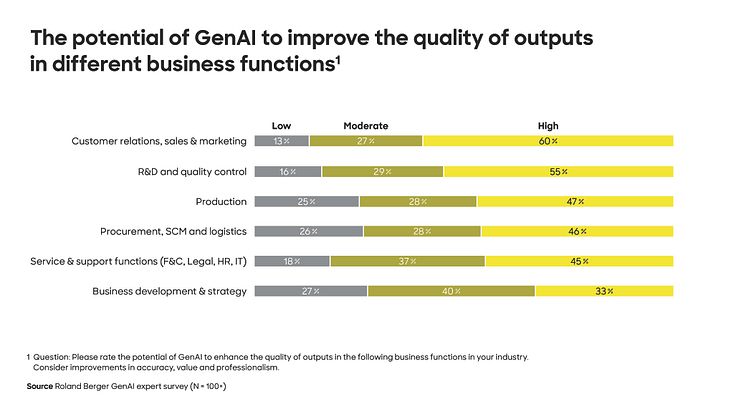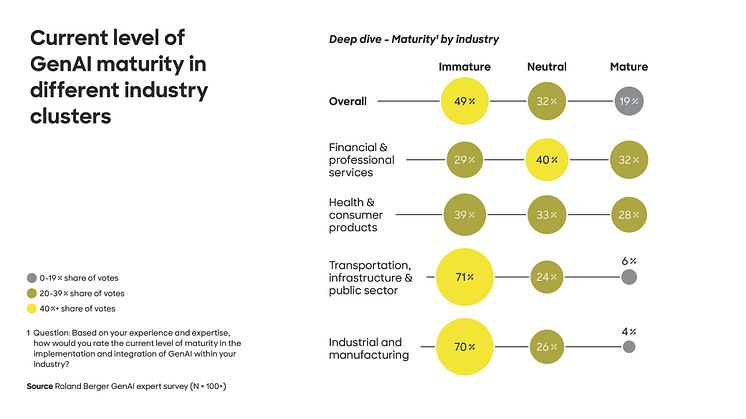
Press release -
Roland Berger study: Only one in five companies rates its GenAI maturity as “advanced”
- 49% of companies still see their GenAI implementation as immature
- GenAI’s greatest potential is seen to lie in automation (93%) and in quality improvement (87%) in the “customer relations, sales & marketing” functions
- 55% of surveyed managers expect GenAI to have a strong impact on job profiles as soon as it filters down through all corporate functions
Munich, September 2024: The “GenAI-driven transformation” study by Roland Berger documents how the companies surveyed recognize the potential of Generative Artificial Intelligence (GenAI) but are largely still in the early stages of implementation. Although managers expect GenAI to deliver significant improvements in efficiency and quality, much remains to be done in terms of organizational preparation and to reach maturity. To conduct the study, Roland Berger experts surveyed more than 100 managers from 17 countries and 21 industries regarding the maturity level of GenAI in their companies.
“From initial skepticism to massive hype, the perception and adoption of this technology have gone through a remarkable transformation,” says Maria Mikhaylenko, Partner at Roland Berger. “Many companies have tried numerous use-cases, developed proofs of concepts, defined areas where AI could bring an impact and value. But the real question is, how to scale it up and move from the selected use-cases to fully productive systems, reestablishing processes and organizations. The big challenge lies not in the technology itself, but in organizations' readiness to transform itself using GenAI's full potential. Companies that can leverage GenAI and adapt their organization accordingly will gain significant efficiency and competitiveness in the future. But this is a transformational journey for some years.”
Great expectations for the potential of GenAI across all business functions
Survey respondents believe that GenAI has great potential to drive automation and improve quality across all corporate functions. That said, customer relations, sales and marketing are the areas where the greatest potential is seen for automation: 93% of respondents see moderate to high potential for GenAI in this field, followed by service and support functions (90%). Research & development and quality control as well as purchasing, supply chain management and logistics are tied for third place with 83% each. Regarding potential to improve quality, this is seen primarily in customer relations, sales and marketing (87%). These functions typically require creative skills, a nuanced understanding of language and strong writing abilities – skills that GenAI is increasingly able to provide. Research & development and quality control (84%) ranks second on this score, followed by service and support functions (82%) in third place.
Companies not properly prepared to implement GenAI
Despite the vast potential seen for the use of GenAI, nearly half of companies (49%) rate their own implementation and use of this technology as immature. Only 19% see the status of their own company as mature in relation to AI implementation. Transportation, infrastructure and public services in particular are still in their very early stages. In these sectors, respondents put the maturity of GenAI implementation at a mere 6%. The figure for industry & manufacturing is even lower, at 4%. In contrast, the digital transformation is evidently further advanced in financial and professional services (32%) as well as in healthcare and consumer products (28%), as these sectors were quick to embrace cloud computing and big data.
As GenAI takes hold across functions throughout every organization, 55% of respondents also anticipate considerable changes to job profiles. The impact is expected to be most pronounced in the financial and professional services sector (71%), followed by healthcare and consumer products (56%), transportation, infrastructure and public services (53%) and industrial & manufacturing (33%).
Key principles underpinning GenAI success
The gap between identified potential and actual implementation presents a major challenge to companies and highlights the need for urgent action. AI will have significant impact if it is implemented at scale, meaning that there are production solutions covering end-2-end business processes at place, but this is a journey of some years. Roland Berger identifies four key principles that are fundamental to every successful transformation. Since GenAI will permeate every area of work, genuinely holistic implementation is essential. Second, initally setting up a centrally steered strategic GenAI unit yields crucial advantages by letting companies manage and scale applications effectively. Comprehensive change management is likewise needed to prepare staff for upcoming changes and equip them with new skills. Lastly, a robust data infrastructure and a flexible AI architecture are critical to successfully integrate and further develop GenAI.
"It is undoubtedly beneficial to gain initial experience with GenAI use cases. However, it is equally important to now lay the foundations for fully leveraging the potential of AI in the future. This includes developing an AI strategy and governance, as well as building a future-proof infrastructure and implementing enterprise-wide, flexible, and context-based data integration. This represents a significant transformation that affects all areas of the business and career paths – including our understanding of leadership," explains Edeltraud Leibrock, Partner at Roland Berger.
Topics
Categories
Roland Berger is one of the world's leading strategy consultancies with a wide-ranging service portfolio for all relevant industries and business functions. Founded in 1967, Roland Berger is headquartered in Munich. Renowned for its expertise in transformation, innovation across all industries and performance improvement, the consultancy has set itself the goal of embedding sustainability in all its projects. Roland Berger revenues stood at more than 1 billion euros in 2023.




